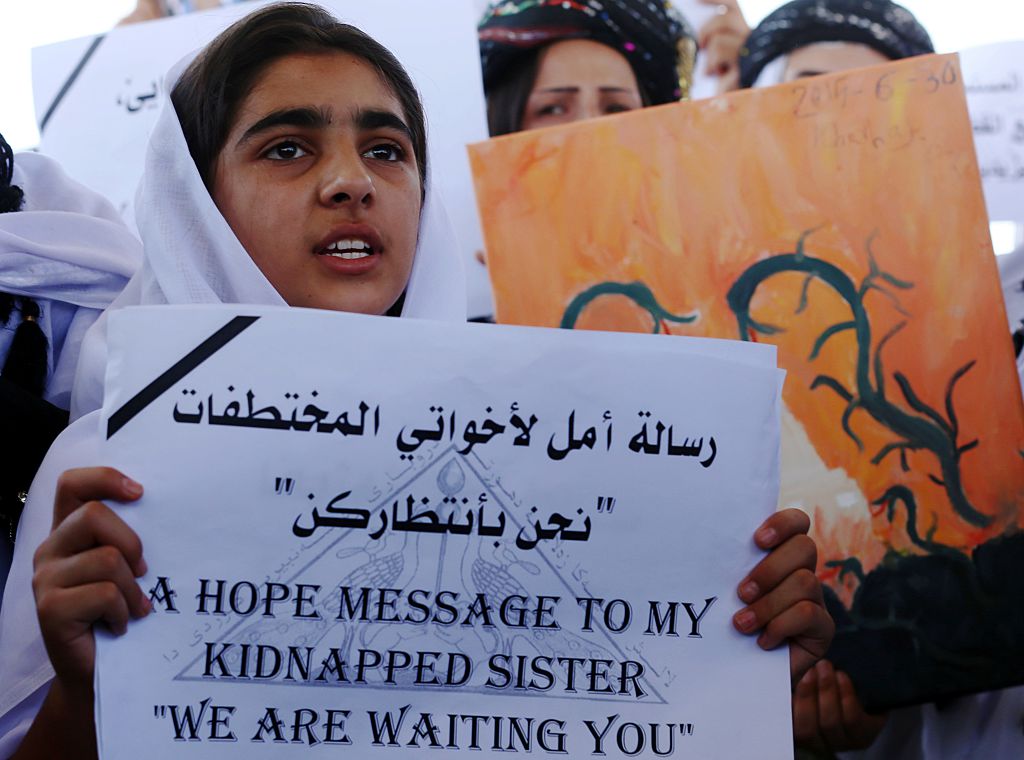ISIS has a 'war spoils' department to process slaves, captured documents show


A free daily email with the biggest news stories of the day – and the best features from TheWeek.com
You are now subscribed
Your newsletter sign-up was successful
It isn't news that the Islamic State governs its self-proclaimed caliphate though a series of bureaucracies, but Reuters has some new details gleaned from a trove of paper documents, hard drives, thumb drives, and other electronic media captured by U.S. Special Operations Forces during a raid in Syria in May. ISIS has diwans, a rough equivalent of government ministries, that deal with securing revenue from natural resources — including oil and looted antiquities — and handling "war spoils," including slaves, the documents show. Many of the documents are fatwas, or religious rulings used as legal code in ISIS-controlled territory.
"Islamic State is invested in the statehood and Caliphate image more so than any other jihadist enterprise," says Aymenn al-Tamimi, an expert on ISIS's structure at the Middle East Forum think tank. "So a formal organization, besides being practical when you control so much contiguous territory and major cities, also reinforces the statehood image."
Among the fatwas, Reuters says, are ones dictating that female captives shouldn't be separated from their young children but also one giving ISIS fighters permission to have sex with their female slaves. Another fatwa deals with when it is acceptable for a son to steal from his father to finance his travel to wage jihad. Last week, Reuters reported on an ISIS fatwa sanctioning the harvesting of human organs. Along with the bureaucratization of ISIS spoils comes the petty infighting: One document on a battle for control of the Diwan of Natural Resources refers to one of the contenders as "a simpleton who can't manage the division."
The Week
Escape your echo chamber. Get the facts behind the news, plus analysis from multiple perspectives.

Sign up for The Week's Free Newsletters
From our morning news briefing to a weekly Good News Newsletter, get the best of The Week delivered directly to your inbox.
From our morning news briefing to a weekly Good News Newsletter, get the best of The Week delivered directly to your inbox.
A free daily email with the biggest news stories of the day – and the best features from TheWeek.com
Peter has worked as a news and culture writer and editor at The Week since the site's launch in 2008. He covers politics, world affairs, religion and cultural currents. His journalism career began as a copy editor at a financial newswire and has included editorial positions at The New York Times Magazine, Facts on File, and Oregon State University.
-
 Samurai: a ‘blockbuster’ display of Japanese heritage
Samurai: a ‘blockbuster’ display of Japanese heritageThe Week Recommends British Museum show offers a ‘scintillating journey’ through ‘a world of gore, power and artistic beauty’
-
 BMW iX3: a ‘revolution’ for the German car brand
BMW iX3: a ‘revolution’ for the German car brandThe Week Recommends The electric SUV promises a ‘great balance between ride comfort and driving fun’
-
 Munich Security Conference: a showdown between Europe and Trump?
Munich Security Conference: a showdown between Europe and Trump?Today’s Big Question Report suggests European leaders believe they can no longer rely on the US for military support – but decoupling is easier said than done
-
 ‘One Battle After Another’ wins Critics Choice honors
‘One Battle After Another’ wins Critics Choice honorsSpeed Read Paul Thomas Anderson’s latest film, which stars Leonardo DiCaprio, won best picture at the 31st Critics Choice Awards
-
 A peek inside Europe’s luxury new sleeper bus
A peek inside Europe’s luxury new sleeper busThe Week Recommends Overnight service with stops across Switzerland and the Netherlands promises a comfortable no-fly adventure
-
 Son arrested over killing of Rob and Michele Reiner
Son arrested over killing of Rob and Michele ReinerSpeed Read Nick, the 32-year-old son of Hollywood director Rob Reiner, has been booked for the murder of his parents
-
 Rob Reiner, wife dead in ‘apparent homicide’
Rob Reiner, wife dead in ‘apparent homicide’speed read The Reiners, found in their Los Angeles home, ‘had injuries consistent with being stabbed’
-
 Hungary’s Krasznahorkai wins Nobel for literature
Hungary’s Krasznahorkai wins Nobel for literatureSpeed Read László Krasznahorkai is the author of acclaimed novels like ‘The Melancholy of Resistance’ and ‘Satantango’
-
 Primatologist Jane Goodall dies at 91
Primatologist Jane Goodall dies at 91Speed Read She rose to fame following her groundbreaking field research with chimpanzees
-
 Florida erases rainbow crosswalk at Pulse nightclub
Florida erases rainbow crosswalk at Pulse nightclubSpeed Read The colorful crosswalk was outside the former LGBTQ nightclub where 49 people were killed in a 2016 shooting
-
 Trump says Smithsonian too focused on slavery's ills
Trump says Smithsonian too focused on slavery's illsSpeed Read The president would prefer the museum to highlight 'success,' 'brightness' and 'the future'
